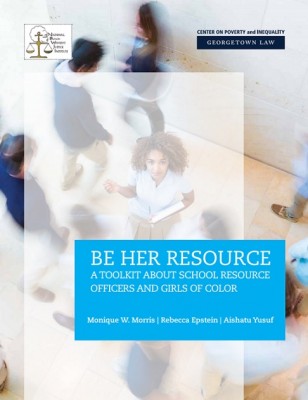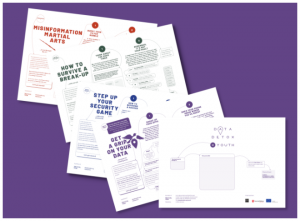Resources Library: Law Enforcement
Start a Search:
Be Her Resource: A Toolkit About School Resource Officers and Girls of Color

As the numbers of police in our schools steadily increase, so do the disproportionate rates of discipline against girls of color. In recognition of this reality, Georgetown Law’s Center on Poverty and Inequality and the National Black Women’s Justice Institute conducted focus groups and interviews primarily in the South with girls of color and police officers to gather first-hand information about their interactions.
Based on this work, this toolkit provides guiding principles and policy recommendations that are designed to improve interactions between girls of color and SROs, with the ultimate goal of reducing these girls’ disproportionate rates of contact with the juvenile justice system.
Children Exposed to Domestic Violence: Resources for Communities
This reference list provides a compilation of reports, articles, websites and practical information for communities interested in addressing or learning more about the topic of children exposed to domestic violence and trauma-informed practices. Particular focus was placed on best or promising practices.
Corrections Agencies and Rape Crisis Centers Working Together Five Things to Know About Confidentiality
A resource from Just Detention International, this document helps advocates navigate confidentiality within carceral settings.
Click here to view the resource.
Culture, Language, and Access: Key Considerations for Serving Deaf Survivors of Domestic and Sexual Violence
This policy and practice brief summarizes the findings from work with the Deaf community and offers practical suggestions for increasing Deaf survivors’ access to victim services and other supports, including those offered by the criminal justice and medical systems. This information providse a framework for meeting the needs of Deaf survivors that is grounded in the cultural and linguistic needs of this community. It will also ground policymakers, practitioners, and first responders in the victim services field in the realities of this often-overlooked community.
Data Detox x Youth

Data Detox x Youth is an activity book to help young people take control of their tech. This interactive toolkit encourages young people to think about different aspects of their digital lives, from their social media profiles to their passwords, with simple activities for reflection and play.
The activity book contains four sections:
- Digital Privacy, which focuses on reducing data traces and understanding online profiling;
- Digital Security, with tips on creating strong and secure passwords;
- Digital Wellbeing, which deals with the addictive nature of smartphones;
- and finally Misinformation, a guide for consuming and sharing information online.
The toolkit is designed for 11 to 16-year-olds who already have their own devices, but it can be used by people of all ages. All you need is a smartphone or a tablet, a printer and something to write with.
Places where the Data Detox x Youth could be used:
- In a classroom (or virtual classroom)
- At home
- By youth groups and organisations (e.g. in a workshop)
Also available in العربية (Arabic), Basque, Brazilian Português, Čeština (Czech), Deutsch, Español, Ελληνικά (Greek), Italiano, Nederlands, Norsk, Português and Shan.

